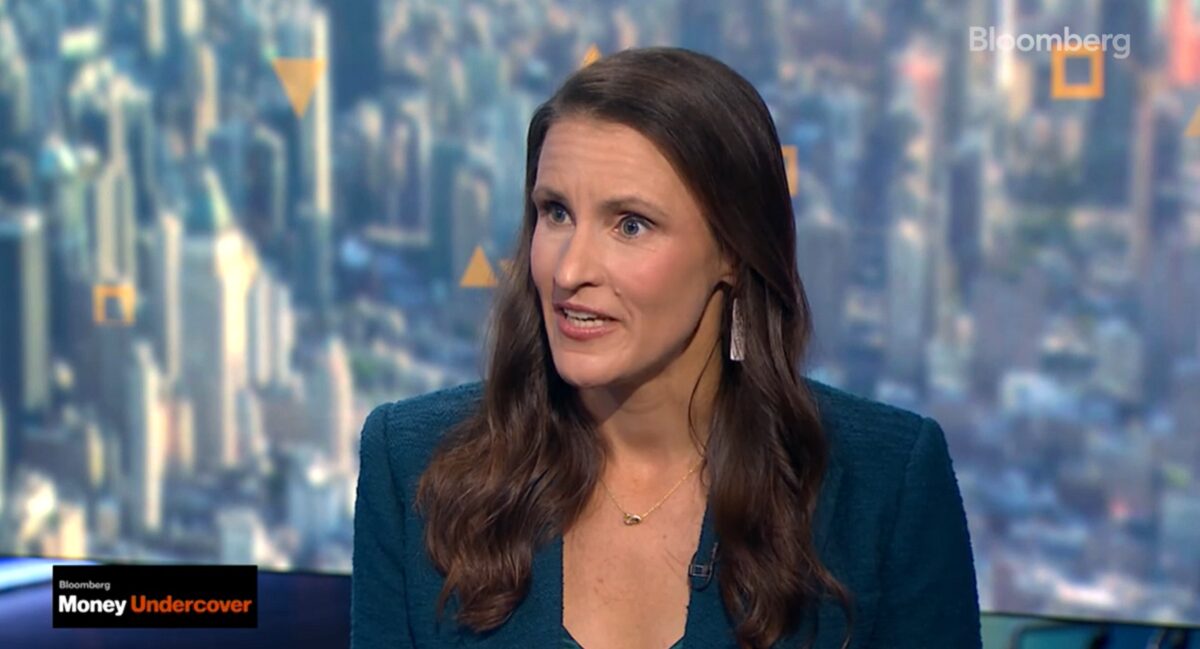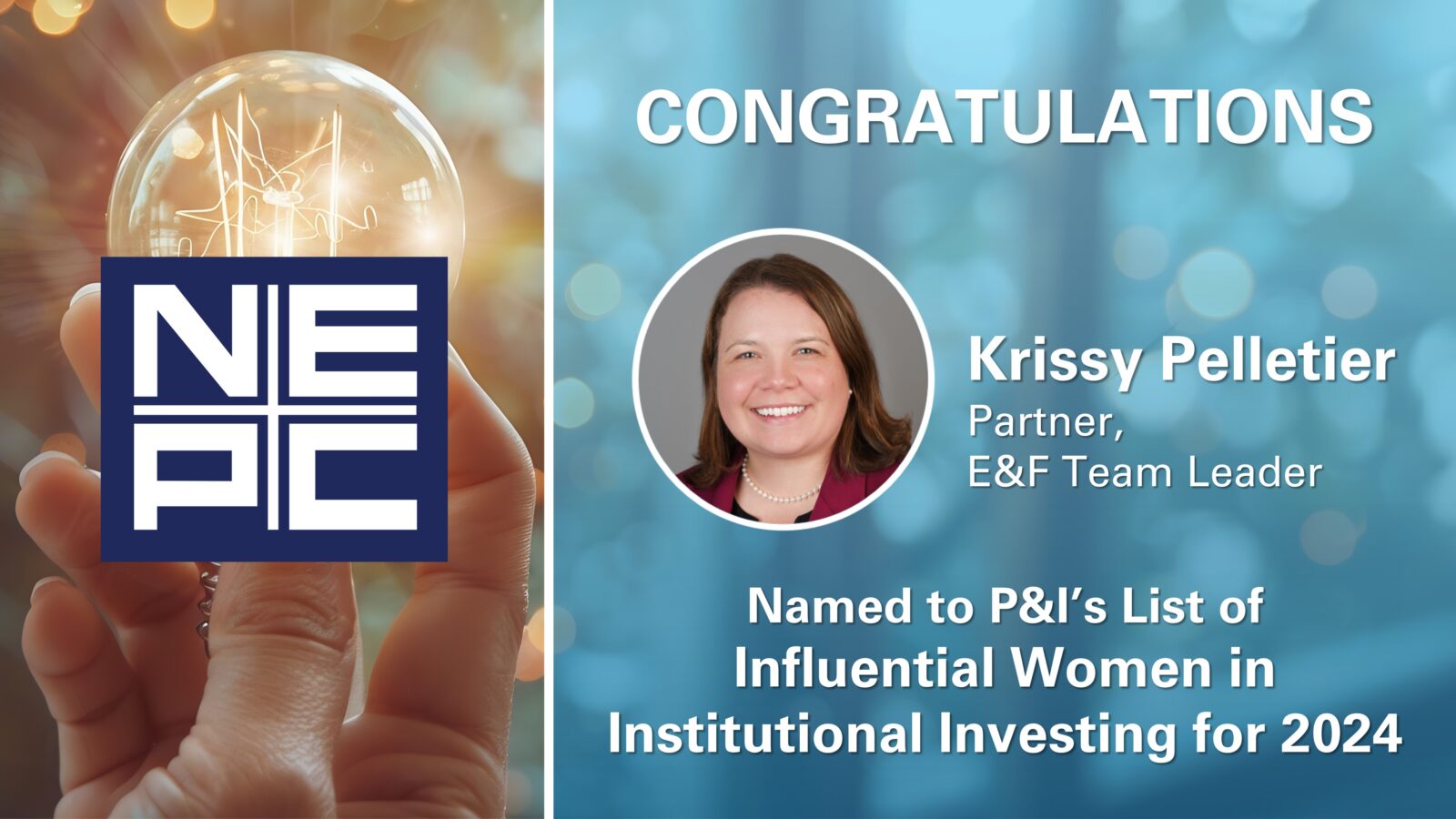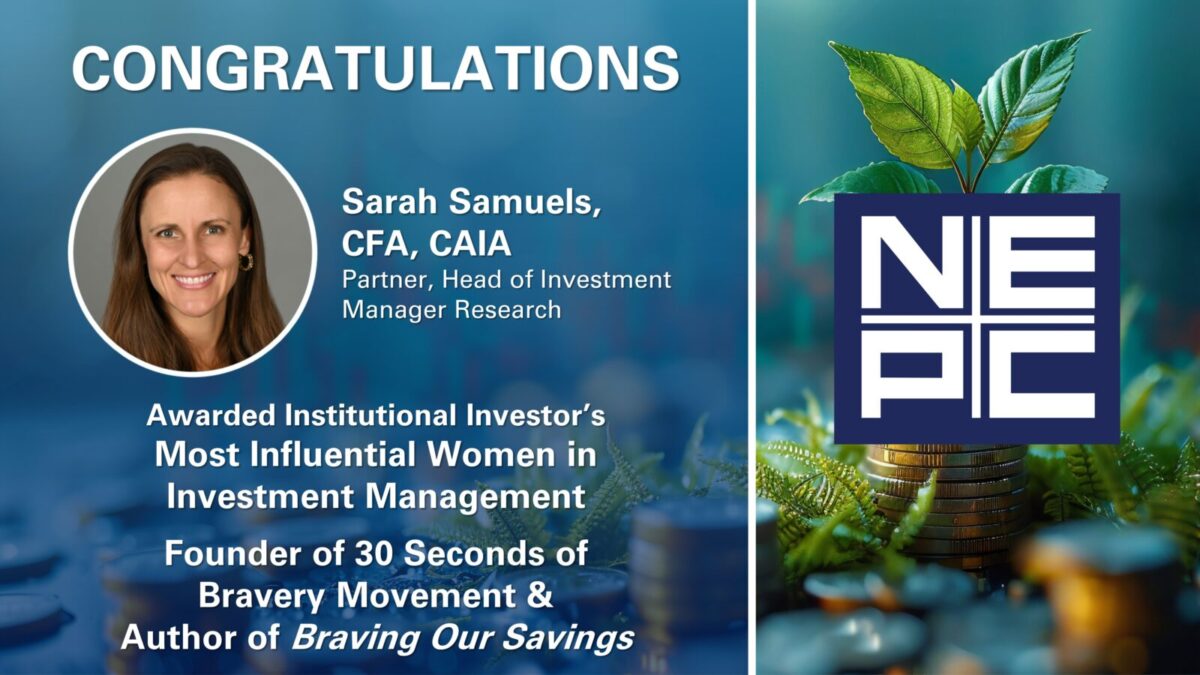Pensions & Investments: Endowments with more U.S. stocks, hedge funds top returns for 2024 fiscal year
NEPC Partner and Practice Group Leader, Kristin Reynolds, has been featured in an article in Pensions & Investments for her commentary on exceptional endowment returns. View excerpts below or read the full article on the Pensions & Investments site here.
College and university endowments boasting higher allocations to domestic equities and hedge funds chalked up positive returns for the second fiscal year in a row, even stronger than the previous year.
. . .
Hedge funds may have made the difference for some endowments when comparing fiscal year 2024 to fiscal year 2023, said Kristin Reynolds, partner and practice group director at NEPC.
“There’s a whole group in the middle that I think are interesting, that have diversified strategies that are thinking about the world in a more conventional manner,” said Reynolds. “They had a high year for fiscal year 2024 if they had public equity, but also diversifiers helped in 2024. When I say diversifiers, I mean what other people might call hedge funds or output-oriented strategies. With the volatility in the markets and China having a rally, strategies that were more globally oriented but also less tied to public markets did well.”
Reynolds said those endowments may have struggled more in fiscal year 2023.
. . .
“Private equity has been the main driver of returns for the long-term period,” said NEPC’s Reynolds. “You can imagine that the questions are around (whether) private equity drive returns in the future, and so there are a lot of discussions about private equity valuations largely coupled with public equity valuations.”
Reynolds said that while in the last two years private equity returns have been lower, she still thinks there are strong returns ahead in the long term, especially in areas like middle-market buyout funds, the kinds of areas where operators are strongly involved.
Click here to read the full article on the Pensions & Investments site.
Bloomberg Markets: Money Undercover - NEPC Partner Sarah Samuels
NEPC Partner and Head of Investment Manager Research, Sarah Samuels, sat down with Lisa Abramowicz of Bloomberg Markets to share her expertise on key trends in institutional investing, as well as highlighting that CIO mindset which drives returns in today’s complex markets.
Pensions & Investments: Hightower Holding to Acquire Majority Stake in NEPC
NEPC has been featured in an article in Pensions & Investments regarding the majority stake acquisition by Hightower Holding. View excerpts below or read the full article on the Pensions & Investments site here.
Hightower Holding, a Chicago-based wealth management firm, has agreed to acquire a majority stake in Boston-based investment consulting firm NEPC.
Hightower and NEPC executives said the deal should close in early 2025. They declined to provide further details on the costs of the transaction, beyond noting that NEPC professionals would continue to retain significant stakes in NEPC, as well as Hightower.
. . .
Together, Hightower — a leading industry consolidator of 140 U.S. financial advisory practices since its founding in 2008 — and NEPC, with $1.66 trillion in assets under advisement or management, would boast $258 billion in assets under management.
. . .
Meanwhile, Michael Manning, managing partner of NEPC, will join the Hightower’s board of directors once the deal closes. Manning, in the same interview, said the deal would help accelerate the growth of an NEPC wealth management segment that, while only 3% of the firm’s OCIO business, had already become a “full fledged business line” from a revenue perspective over the past seven years or so.
The synergies of a Hightower-NEPC combination make the deal an exciting one for both firms, agreed Oros and Manning. This is truly a “one plus one equals five” situation, noted Oros.
Click here to read the full article on the Pensions & Investments site.
Hightower Announces Strategic Investment in NEPC
CHICAGO and BOSTON, October 21, 2024 – Hightower Holding today announced that it will acquire a majority interest in NEPC, LLC (“NEPC”), a leading investment consultant and outsourced chief investment officer (“OCIO”). Combining under a common parent company will allow each organization, NEPC and Hightower Advisors (“Hightower”), one of the country’s leading RIAs, to expand their commitments to clients to deliver institutional-quality investment solutions and research-driven advice.
As more private wealth investors express interest in allocations to private market investments, NEPC’s institutional research and investment capabilities will bolster Hightower’s existing set of wealth management solutions for its advisors and their clients. With this transaction, NEPC’s clients will continue to receive investment advisory and OCIO services while creating a new growth channel in partnership with Hightower. A combined Hightower and NEPC strategically positions both firms across their target markets and adds scale and resilience. The combination of Hightower, its affiliates, and NEPC represents over $1.8T in AUA and $258B in AUM.
Similar to previous Hightower Holding investments, NEPC is expected to retain its culture, executive team, and investment process, ensuring no disruption to its existing business operations and client service. Additional enhancements to both organizations’ offerings will create new opportunities for NEPC to serve the private wealth channel. As part of the transaction, NEPC Managing Partner Mike Manning will join the Hightower Board of Directors upon closing.
“This is a transformational combination that highlights the future of financial services and wealth management. Our relationship with NEPC stemmed from the exciting and distinctive opportunity that both businesses can offer the private wealth market when combined,” said Bob Oros, Chairman & CEO at Hightower Holding. “We create a stronger whole by maintaining our company identities and deploying our strengths together. In partnership with NEPC, Hightower advisor practices will have expanded access to investment management solutions, research capabilities, and a compelling set of investment opportunities. We are excited to embark on this journey alongside NEPC and support their future growth in their current markets and new ones.”
“Since NEPC’s founding, our top priority has been to provide clients with pioneering investment solutions and consulting,” said Michael Manning, Managing Partner at NEPC. “Today’s announcement is a continuation of this commitment. Hightower represents the ideal partner for us, as we leverage the strong growth of our current clients and continue our expansion into the private wealth market, all while preserving the strong culture and investment solutions that our clients trust and rely upon. We are confident that our firm is strategically positioned for the future alongside Hightower, enabling us to deliver conviction and quality counsel to assist our clients in achieving their optimal outcomes.”
In the transaction, NEPC was advised by Moelis & Company LLC and Goodwin Proctor, LLP provided legal counsel. Hightower Holding engaged Berkshire Global Advisors to provide industry research on the institutional investment consulting and OCIO industry and Kirkland & Ellis, LLP provided legal counsel.
About NEPC, LLC
NEPC is a global investment consultant, private wealth advisor, and OCIO provider serving over 400 retainer clients and more than $1.66 trillion in total assets. Combining a proprietary investment team dedicated to the long-term challenges facing investors with our client-centric model, Boston-based NEPC builds forward-looking investment portfolios for institutional investors and ultra-high-net-worth individuals and families. To learn more visit nepc.com.
About Hightower
Hightower is a wealth management firm that provides investment, financial and retirement planning services to individuals, foundations and family offices, as well as 401(k) consulting and cash management services to corporations. Hightower’s capital solutions, operational support services, size and scale empower its vibrant community of independent-minded wealth advisors to grow their businesses and help their clients achieve their vision of “well-th. rebalanced.” Based in Chicago with advisors across the U.S., the firm operates as a registered investment advisor (RIA). Learn more about Hightower’s collaborative business model at www.hightoweradvisors.com.
Securities offered through Hightower Securities, LLC member FINRA/SIPC. Hightower Advisors, LLC is a SEC registered investment advisor.
Media Contacts
Prosek Partners for NEPC
Alex Hinson
[email protected]
646-818-9072
Magnitude, Inc. for Hightower Advisors
Daniel Delson
[email protected]
917-328-9337
Financial Times: Endowments and Foundations Race to Outsource Investment Management
NEPC Partner and Head of Portfolio Strategy, Scott Perry, has been featured in Financial Times for his commentary on the increasing amount of endowments and foundations using OCIO services. View excerpts from the article below or read the full article on the Financial Times site here.
Small US endowments and foundations are racing to outsource their investment management in the hopes of getting access to profitable but illiquid alternative markets amid growing funding challenges.
. . .
By the end of June, Boston-based NEPC, an institutional investment consultancy, had managed $14bn for endowments and foundations as an OCIO. That was up 48 per cent from three years ago. “It is a part of the market that continues to grow materially,” said Scott Perry, head of portfolio strategy at NEPC.
Click here to read the full article on the Financial Times site.
Pensions & Investments: Mentors helped Influential Women along the way. Honorees pay it forward.
NEPC’s Krissy Pelletier was recently featured in an article on Pensions & Investments as one of the “Influential Women in Institutional Investing“. View excerpts from her interview below or read the full article on the Pensions & Investments site here.
After studying economics at what is now Simmons University, Krissy Pelletier “was lucky to work with a great mentor (and) portfolio manager” on the public market side of Wellington Management. She still remembers the words said by Michael Carmen to set the tone going forward on her first day as an administrative assistant.
“He said, ‘Krissy, you didn’t go to Simmons to get this great degree simply to be an administrative assistant. So tell me, what brought you to Wellington? What made you interested? Let’s talk about what I do and how we can work together.’ He wanted to see me succeed. He was interested in what I wanted to be a part of,” Pelletier said.
She would leave Wellington in 2006 as a stock-focused research associate, but Carmen, who is still at the $1.25 trillion firm as co-head of private investments, still serves as a mentor to her. Pelletier still checks in him now as a partner and head of endowments and foundations at the $1.7 trillion consultant NEPC — and as a member of Pensions & Investments’ 2024 class Influential Women in Institutional Investing.
. . .
When Pelletier joined NEPC in 2008, she worked for Cathy Konicki. Described by Pelletier as “a really great mentor,” Konicki “led the endowment and foundation team for a really long time” before retiring in 2022.
Konicki took Pelletier “under her wing, showed her the ropes” and challenged the new consultant “to do better and prepare in different ways.” But Pelletier noted her mentor was particularly receptive if one advocated for their interest or passion, as she did in Konicki’s office after a year or two.
Pelletier said she would say, “Cathy, here are the things that I’m less interested in, but let me tell you about things I’m really interested in. So if these opportunities come up, can you think of me? Can you put me in a position to participate? If this type of prospect walks in the door, can I be on the team? Can I help?”
In turn, Konicki would ask “why is that an interest?” and “why would you be successful working with that type of group?” Exchanges like that are what Pelletier said “helped me carve a path within endowments and foundations.” Having Konicki’s support for a career that “was always marrying my personal passion and professional interest” helped Pelletier understand that her path was “a good fit for me.”
Click here to read the full article on the Pensions & Investments site.
Pensions & Investments: Inclusive culture key to building diverse, equitable industry, P&I's Influential Women say
NEPC’s Krissy Pelletier was recently featured in Pensions & Investments as one of the “Influential Women in Institutional Investing“. View excerpts from her interview below or read the full article on the Pensions & Investments site here.
To find the next generation of talent specifically, “you have to look in non-obvious places,” Krissy Pelletier said. At the $1.7 billion consulting firm NEPC, she serves as partner and head of endowments and foundations.
Rather than just finding prospective candidates at conferences or networking events, recruiters and hiring managers need to be “engaged with different colleges and universities,” she said, adding that they should reach out to their network and say, “I’m looking for people with these types of qualities” as opposed to what specific role they want to fill.
“There’s a lot of training we can do in this industry, but there are some really important qualities that we should all be looking for, whether that’s intellectual curiosity, productivity or excitement — people just wanting to make a difference,” Pelletier said.
. . .
For NEPC’s Pelletier, she had the benefit of having flexibility as she was studying in the Executive MBA program at the University of Virginia’s Darden School of Business. From 2012 to 2014 — a time “before hybrid was a thing” — she travelled from her home in Boston to Charlottesville once a month for two days, and attended online classes two times per week.
During this “really difficult, but such a rewarding experience,” the consulting firm allowed her to maintain her full-time job by compressing her work week from four days to two days. In addition to her then-partner and now-husband’s support, Pelletier said that NEPC “really invested in me” and “set a tone for my success.”
This happened before Pelletier became a working parent in the industry, which is a subject “we should talk more and more about, and encourage people to share their stories,” she said.
. . .
At any job, Pelletier said it helps to know that there’s a person who “you can call for all manner of advice, and the person you can call to say, ‘I’m struggling with this,’ ‘I need your help,’ (or) ‘I need your advice.’” This person could also be someone to call when in need to vent about something, or in need of feedback on some work — just someone “you can count on and rely on” to figure out “how to do that advocacy work,” she added.
“Having somebody that’s really going to be truthful with you on your side and developing that one core relationship — at least one — is another way to be on the successful path,” Pelletier said. “For me, it was really important to have that — a woman that I really respected and looked up to.”
Click here to read the full article on the Pensions & Investments site.
Pensions & Investments: Buoyed by U.S. Equities, Public Pension Funds See Double-Digit Returns This Year
NEPC’s Margaret Belmondo was recently featured in Pensions & Investments for her commentary on all-weather portfolios and emerging markets. View excerpts below or read the full article on the Pensions & Investments site here.
U.S. public pension funds chalked up a second straight year of positive returns for the fiscal year ended June 30, with half posting double-digit numbers despite a somewhat muted bond market and continuing challenges in private markets.
. . .
Margaret Belmondo, partner and public fund team leader at investment consultant NEPC, echoed that it has been frustrating for the firm to see such a narrow market outperforming when they want to create a diversified all-weather portfolio, but signs are the market is broadening again since the beginning of fiscal year 2025.
“We’re seeing a broader market in value names, and we’re also seeing it in small caps, which is great,” Belmondo said. “It’s so hard because our clients are diversified across all asset classes … so we want to create an all-weather portfolios. It does get frustrating when you just see this narrow market outperforming, but we do see ourselves coming out of it.”
“I also think with the Fed going to begin to cut rates in September, that should be a tailwind. But there’s still a lot of uncertainty,” she said.
Click here to read the full article on the Pensions & Investments site.
Pensions & Investments: Krissy Pelletier Named to 2024 Influential Women in Institutional Investing List
NEPC’s Partner & Head of Endowments and Foundations, Krissy Pelletier, has been named to Pensions & Investments’ 2024 Influential Women in Institutional Investing list. View excerpts from her interview below or the full interview on the Pensions & Investments site here.
From a young age, Krissy Pelletier has spent time volunteering with schools and nonprofit organizations. Her love for the work taught her to build strong relationships by listening to people’s stories and interests, and getting them “to pull that passion” into the job.
. . .
Shifting to work in the nonprofit sector, Pelletier took on seemingly every role including writing grants and planning events. “It was a great experience, but I knew after about a year that I wanted to get back into using my investment acumen,” Pelletier said.
. . .
While her external work is limited until her daughter is “a little bit older,” Pelletier goes back to Simmons’ economics department for an annual event that supports graduating students and recent alumni.
“When I graduated, I didn’t even know what investment consulting was,” she added. “I didn’t really understand the investment industry beyond the mechanics of the classes I’ve been to. Going there and chatting about career paths, it’s really rewarding.”
Click here to read the full interview on the Pensions & Investments site.
Institutional Investor: Sarah Samuels Named to 2024 Most Influential Women in Investment Management Category
NEPC’s Head of Investment Manager Research & Partner, Sarah Samuels, has been named to Institutional Investor’s 2024 Most Influential Women in Investment Management category. View excerpts from her interview below or the full interview on the Institutional Investor site here.
Sarah has traversed the industry, alternating between asset management, investing as an asset owner, and her current role in consulting. After she earned her bachelor’s degree in German and Business from the University of New Hampshire, she spent six years at Wellington Management Company and one year at Boston Advisors.
. . .
II: What is the biggest challenge facing the industry today?
Sarah: The biggest challenge facing the industry is the required shift in mental models to adapt to an environment where cash and fixed income are viable options to invest in the face of inflation. These are things that anyone under 38 has not had to develop a skill set for. There’s a whole swathe of investors who need to re-map how their brains work to build portfolios, and it may change some long-standing assumptions.
The other is, do the map: Model out what the deals are today.
. . .
II: What is the most exciting part of the job that gets you up in the morning?
Sarah: It’s early-stage investing, as well as lending with the right GP partners, so being a lender with smart underwriting: There’s a lot of interesting things, and valuations are very interesting.
I didn’t know this industry existed. I started out as an admin at Wellington. I thought I’d be a lifer as an admin until I saw a woman who was an admin like me. Jean Hines was very commanding and picked healthcare stocks. I watched how she carried herself and the credentials that she got.
I had some other mentors: One was Michael Even, MassPRIM Board Investment Committee member, and the other was Erinn King then Vice President at Wellington Management Company, currently Chief Strategy Officer at Income Research + Management.
. . .
II: If you were not an allocator, what would you be doing today?
Sarah: I would be teaching people how to ski out in the west or in Europe.
. . .
II: If you could change one thing about the industry, what would it be?
Sarah: I wish that people could stay focused on to the capital that we oversee and the responsibilities that we have as stewards of capital and that what makes the world go round, remembering the members whose capital we are managing.
Click here to read the full interview on the Institutional Investor site.









